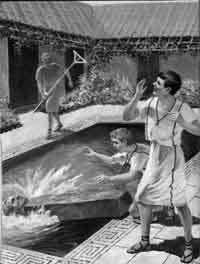 Book I-A: Meet the Family
Book I-A: Meet the FamilyMy attempt at satire, published in the Spring 1999 issue of the National Senior Classical League's Litteras Societae (Letter of the League).
Did the Romans go to Disneyland?
A student's take on the Ecce Romani textbooks.
Melissa Gutierrez
In an anonymous high school in Colorado, Latin students add their own comments to their textbooks after purchasing them. After tutoring several lower-level students, I began to notice a central theme in their annotations to the full-page illustrations that begin each unit: Disney.
Whether it was the famous quip "We're going to Disneyland!" or multiple instances of Disney characters cavorting with Roman children, the theme played itself out in book after book. Unable to convince Zack to let me borrow his book long enough to scan his annotations, I have included my own pristine copies with a short summation of the comments I've seen on each. Please note that the Ecce Romani books are copyrighted by Longman Publishing Group and the images are by Yao Zen Liu.
 Book I-A: Meet the Family
Book I-A: Meet the FamilyThe first book contains the greatest amount of visual clues to understanding the text. We meet the Cornelii family as they are in the final stages of the Publishers' Clearinghouse multi-million sesterce sweepstakes. To ease the tense atmosphere, the children resort to amusement through mischief.
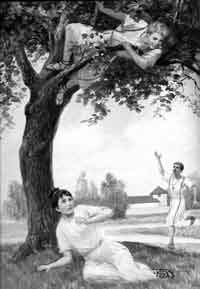 Unit three introduces us to the
Cornelii boys, Marcus and Sextus. To expend excess energy, they run around the
garden pool until -- oops! -- a statue falls into the pool. Despite the great
visual gag, the slave watching them is NOT amused and yells, "Abite,
molesti!" This means, "You'll never go to Disneyland, you little
maggots!"
Unit three introduces us to the
Cornelii boys, Marcus and Sextus. To expend excess energy, they run around the
garden pool until -- oops! -- a statue falls into the pool. Despite the great
visual gag, the slave watching them is NOT amused and yells, "Abite,
molesti!" This means, "You'll never go to Disneyland, you little
maggots!"
Sextus enjoys climbing trees, whether for personal amusement or because he's afraid of wolves. In unit four, we find him in a tree scaring his sister Cornelia. Before she can manage more than a frightful face, Marcus runs up and saves her.
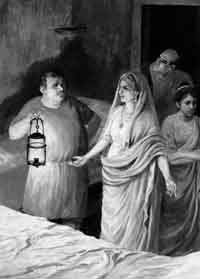 The Cornelii are forced to stay
in the Roman equivalent of a Motel 8 before they continue on to Rome. Mrs. Cornelius
is dissatisfied with the apparent lack of housekeeping and informs the innkeeper
neither she nor her daughter will sleep in a bad that looks like it hasn't been
changed since the rape of the Sabines.
The Cornelii are forced to stay
in the Roman equivalent of a Motel 8 before they continue on to Rome. Mrs. Cornelius
is dissatisfied with the apparent lack of housekeeping and informs the innkeeper
neither she nor her daughter will sleep in a bad that looks like it hasn't been
changed since the rape of the Sabines.
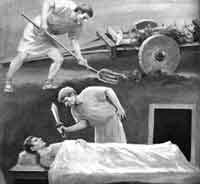 Her ideas on the quality of the inn
are accurate. Overnight, one dissatisfied customer kills another for his rare
purple Furby and disposes of him in a cart full of dung, lacking a Dumpster.
Her ideas on the quality of the inn
are accurate. Overnight, one dissatisfied customer kills another for his rare
purple Furby and disposes of him in a cart full of dung, lacking a Dumpster.
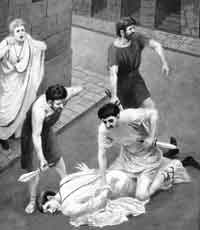
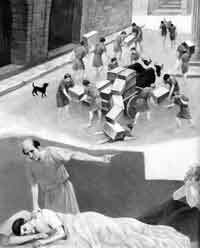 Once they arrive in Rome, it is
bustling with more excitement and corrupting influences than if the children
had seen Mickey Mouse take his head off! Marcus oversleeps and misses seeing
a slave get crushed by stone blocks falling off a cart.
Once they arrive in Rome, it is
bustling with more excitement and corrupting influences than if the children
had seen Mickey Mouse take his head off! Marcus oversleeps and misses seeing
a slave get crushed by stone blocks falling off a cart.
However, he is jumped the same day by a couple of robbers. While Sextus hopes the one-armed man is really the one from The Fugitive, Marcus wisely saves himself while being sat on with the line "Nihil pecuniae habeo" or "I'm underage."
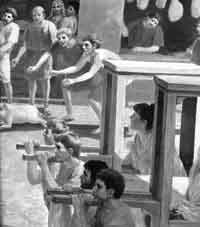 Book II-A: Home and Family
Book II-A: Home and FamilyWe discover that Romans enjoy the company of small animals. While Cornelia and her mother are riding in sedan chairs through the streets of Rome, they witness the sacred sport of pork chasing. Her mother, ever the composed Roman woman, conceals her delight.
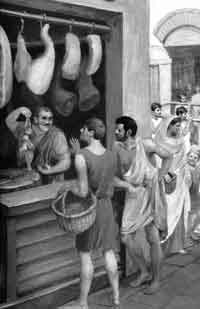 Other men, such as Pseudolus, run butcher shops
so they can trade insolent comments with fellow meat-eaters. We meet up again
with poor Syrus (who was run off the road in book I-A) while he tries to purchase
a fine ham. Pseudolus amuses himself by dangling a hare by its ears while he
bargains with Syrus.
Other men, such as Pseudolus, run butcher shops
so they can trade insolent comments with fellow meat-eaters. We meet up again
with poor Syrus (who was run off the road in book I-A) while he tries to purchase
a fine ham. Pseudolus amuses himself by dangling a hare by its ears while he
bargains with Syrus.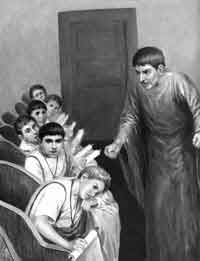
It seems that the Disney references have slacked off somewhat (aside from the animals) but we find unit 39 leaves Sextus dreaming of Disneyland while his classmates give him the Vulcan death stare and Marcus shows his true Trekkie colors as Spock.
My notes [from unit 39] have a quote from a student:
Thus we can safely conclude that the Romans only dreamed of Disney.
Melissa Gutierrez was easily spotted during the Amherst convention wearing her garland of white flowers. She may be reached via e-mail at highqueen (at) netscape (dot ) net.